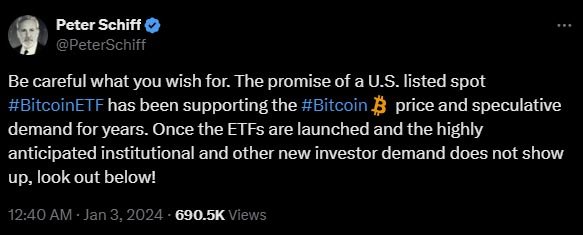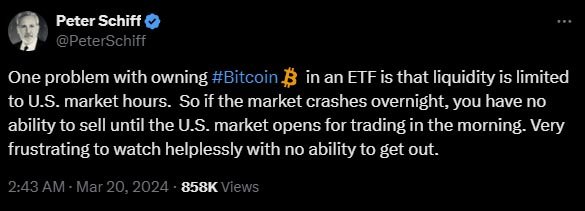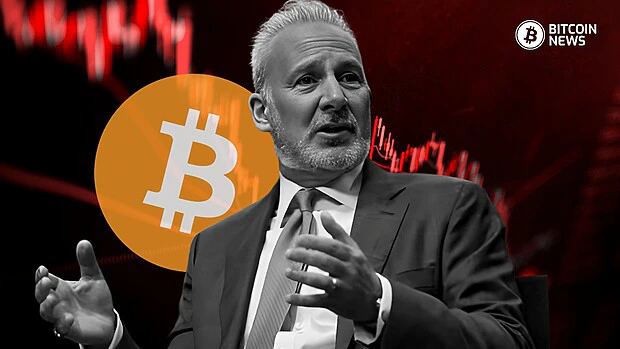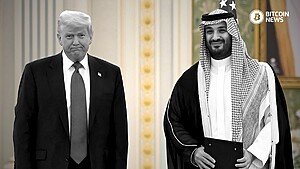Peter Schiff, a renowned economist and financial commentator, has been a persistent critic of Bitcoin. Known for his strong advocacy of gold, Schiff’s skepticism towards Bitcoin stems from his views on its intrinsic value, market behavior, and long-term sustainability.
This article delves into Peter Schiff’s Bitcoin skepticism, recent comments and predictions, providing insight into his perspective.

In his commentary, Schiff emphasizes that the ETF market is manipulating bitcoin’s price, and once the demand for these financial products decreases, bitcoin could face severe price drops.
He suggests that without the backing of these speculative instruments, bitcoin lacks the intrinsic value to maintain its current price levels.

Peter Schiff has made several bold predictions regarding bitcoin’s future price movements. He identifies $60,000 as a critical support level, suggesting that a fall below this mark could trigger a decline towards $20,000.
Schiff’s analysis is based on the formation of a “triple top” pattern, which he believes could signal a bearish turn for bitcoin.
Schiff’s predictions often draw criticism from the Bitcoin community, who argue that his forecasts are overly pessimistic and not reflective of Bitcoin’s market dynamics.
Despite his track record of inaccurate predictions, Schiff maintains his stance, viewing bitcoin as an overvalued asset destined for significant corrections.
According to Schiff, intrinsic value is derived from the utility and tangible properties of an asset.
For example, gold, which Schiff often champions, has intrinsic value because it is used in various industries, including electronics, jewelry, and dentistry, and has a long history of being a store of value.
“Intrinsic value is a measure of what an asset is worth. This measure is arrived at by means of an objective calculation or complex financial model. Intrinsic value is different from the current market price of an asset.”
– Source: Investopedia
Peter Schiff argues that Bitcoin has no intrinsic value, but this view overlooks several key aspects.
Bitcoin’s value stems from its capped supply of 21 million coins, ensuring scarcity akin to gold. Its decentralized and secure network eliminates the need for trusted intermediaries, providing monetary sovereignty and financial autonomy.
Bitcoin’s transparency and immutable ledger offer unparalleled security against fraud and censorship. Additionally, its increasing adoption and continuous innovation reinforce its utility and trustworthiness as a digital store of value.
Thus, dismissing Bitcoin’s value ignores its unique properties and revolutionary impact on the financial system.
Related: Bitcoin Has Intrinsic Value | Beyond the Ponzi Scheme Narrative
Robert Breedlove explores the fundamental misunderstandings behind questioning Bitcoin’s intrinsic value. Breedlove argues that the concept of intrinsic value is flawed and instead suggests that value is subjective, based on individual perception and utility.
He explains that Bitcoin’s value comes from its decentralized nature, security, and the economic freedom it offers.
Central to Schiff’s critique of Bitcoin is his comparison with gold.
Schiff argues that gold, with its long-standing history as a reliable store of value, far surpasses Bitcoin. He points out that gold’s tangible properties and historical precedent make it a safer and more stable investment compared to the highly volatile bitcoin.
In recent debates, Schiff has highlighted gold’s performance amidst rising inflation and declining fiat currency values. He contrasts this with bitcoin’s volatility and reliance on speculative investment.
Schiff asserts that Bitcoin lacks the intrinsic value that underpins gold’s status as a store of value. He describes investing in bitcoin as akin to betting in a casino, where success is more about luck than sound financial principles.
Related: Robert Kiyosaki Explains Why He Prefers Bitcoin Over Gold
Peter Schiff remains a steadfast critic of Bitcoin, consistently arguing that it lacks intrinsic value and is overly reliant on speculative investment.
While his views provide a counter-narrative to the bullish sentiment surrounding Bitcoin, they underscore the ongoing debate about its future.
As the market evolves, the validity of Schiff’s predictions and their implications for Bitcoin will be closely watched by investors and analysts alike.










